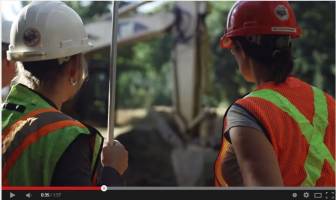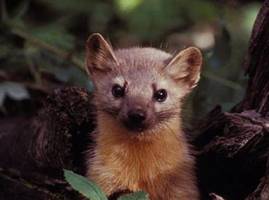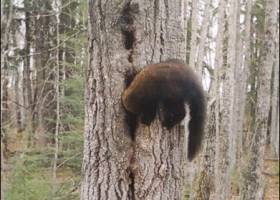When it comes to wildlife, no other species symbolizes the Holidays more than the reindeer. Their incorporation into Christmas literature dates back to the early 1800s, though the roots of the association likely stretch back much further, to Norse mythology and the Scandinavians’ domestication of reindeer to pull sleds. Whatever the legend’s origins, the eight tiny ungulates depicted pulling Santa’s sleigh bear a remarkable resemblance to the caribou found here in BC. Though there are some generalized morphological differences between reindeer and caribou , they are one and the same species: Rangifer tarandus. In North America, the term “reindeer” is usually applied to domesticated caribou, while in Europe, reindeer is used as the blanket term for any animal belonging to the species.
Within Rangifer tarandus exists a number of subspecies. All caribou in BC are classified as belonging to the woodland subspecies ( Rangifer tarandus caribou). There are 52 herds of woodland caribou in the province, which can be further divided into three ecotypes: the Boreal, Northern Mountain and Southern Mountain Caribou. 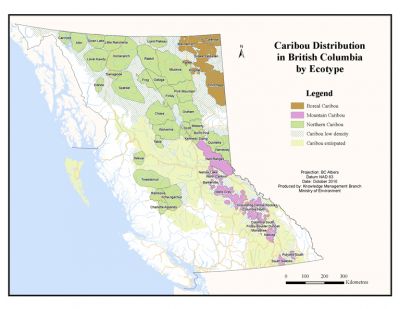 An ecotype is a genetically-distinct group of animals within a species that have adapted to a specific set of environmental conditions. This means that, while caribou from the different ecotypes look similar, they actually behave quite differently. For example, Northern and Boreal caribou live in areas where the snow is shallow enough that they can dig for ground lichens with their large, snowshoe-like feet. Southern Mountain caribou rarely dig for lichens in the winter months: they live in places where the snow is so deep, they have to feed on lichens growing on trees, and are thus dependent on old-growth forest habitat.
An ecotype is a genetically-distinct group of animals within a species that have adapted to a specific set of environmental conditions. This means that, while caribou from the different ecotypes look similar, they actually behave quite differently. For example, Northern and Boreal caribou live in areas where the snow is shallow enough that they can dig for ground lichens with their large, snowshoe-like feet. Southern Mountain caribou rarely dig for lichens in the winter months: they live in places where the snow is so deep, they have to feed on lichens growing on trees, and are thus dependent on old-growth forest habitat.
The following videos commissioned by the 14th North American Caribou Workshop beautifully present the challenges facing each of British Columbia’s caribou ecotypes, and some of the work being done to help ensure these iconic animals remain part of the BC landscape (they even include “caribou cam” footage from video recorders attached to some of the animal’s collars!)
Northern Ecotype (Telkwa Herd)
Boreal Ecotype
Mountain Ecotype (Southern Mountain in Video)
HCTF provided grants for a number of caribou conservation projects this year, including:
Project 4-485: Assessing predation risk from wolves and cougars for caribou in the Purcell Mountains Project 5-230: Habitat use and population monitoring of the Itcha-Ilgachuz caribou herd
Project 6-236: Impacts of Recreation and Wolves on Telkwa Caribou Recovery
Project 7-394: Herd Boundary Refinement for the Chase, Spatsizi, and Frog Caribou Herds
Project 7-424: Defining Nutritional Value of Summer Habitats for Caribou
Reindeer and Caribou Comparison
• Both male and female reindeer and caribou grow antlers (unique amongst the deer family)
• Both reindeer and caribou have large feet that are adapted for walking on the snow, digging through the snow to find food, and swimming.
• Female reindeer have larger antlers than female caribou
• Caribou bulls are larger than reindeer bulls
• Caribou have longer legs and Reindeer are shorter, stouter and more sedentary.
• Reindeer tend to stay with their heard when chased, while caribou scatter
• Reindeer have a flatter nose bridge than Caribou.
For more interesting facts about caribou/reindeer (both biological and cultural), click here.


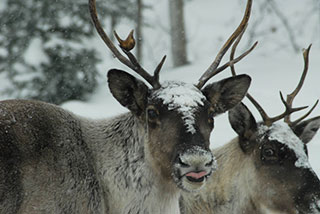

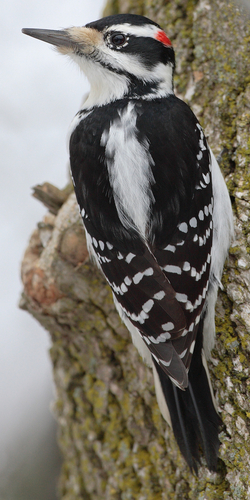 Christmas Bird Count: The annual Christmas Bird Count kicks off this Sunday. Find a count near you and participate in the longest-running citizen science survey in the world. Started by the Audobon Society on Christmas Day in 1900, this early winter bird census involves thousands of volunteers across the Western Hemisphere counting birds in designated areas over a 24 hour period. The counts are held on specific days between December 14th and January 5th. Anyone can participate (it’s free!) but you have to make arrangements in advance with the person designated as circle compiler. You can get the contact details for the circle compiler in your area
Christmas Bird Count: The annual Christmas Bird Count kicks off this Sunday. Find a count near you and participate in the longest-running citizen science survey in the world. Started by the Audobon Society on Christmas Day in 1900, this early winter bird census involves thousands of volunteers across the Western Hemisphere counting birds in designated areas over a 24 hour period. The counts are held on specific days between December 14th and January 5th. Anyone can participate (it’s free!) but you have to make arrangements in advance with the person designated as circle compiler. You can get the contact details for the circle compiler in your area 